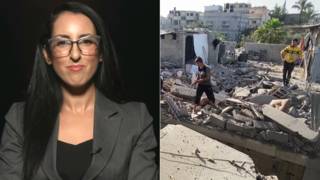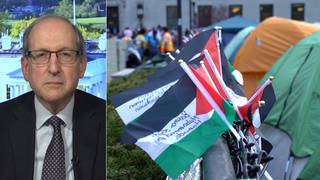Press freedom groups are calling on Congress to pass new legislation protecting media workers, on the fifth anniversary of the state-sponsored killing of Washington Post columnist Jamal Khashoggi by Saudi Arabia in Istanbul in 2018. The Khashoggi Act, introduced Monday, would allow lawsuits in the United States against governments implicated in extraterritorial repression. The separate Khashoggi Resolution pledges U.S. action to hold the Saudi government accountable for human rights abuses. On Monday, elected officials in Los Angeles welcomed friends and family of Jamal Khashoggi to a street dedication ceremony on a stretch of Wilshire Boulevard outside the Consulate of Saudi Arabia. A sign declaring the space Jamal Khashoggi Square reads, “A journalist and advocate for human rights slain by the Saudi government.” In Washington, D.C., the National Press Club held a moment of silence to remember Khashoggi and other journalists whose killings have gone unpunished. Joining the ceremony was Michael Omer-Man, director of research for Israel-Palestine at DAWN, the organization founded by Khashoggi.
Michael Omer-Man: “Whereas Jamal’s death outraged the world and seemed for a moment to inject human rights into U.S. foreign policy in the MENA region, today, unfortunately, that no longer seems to be the case. That’s most apparent in Saudi Arabia, but not only. Following the killing of Shireen Abu Akleh, we saw how the U.S. government literally tried to redefine 'accountability' in order to shield an ally from scrutiny. This is unacceptable. Jamal was murdered for the power of his ideas and because even in the face of mortal danger he refused to remain silent.”










